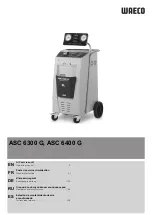
Electrical system
I
DANGER
Stop the engine and switch off
the main switches to break the
current before working on the
electrical system. Isolate shore
current to any accessories
mounted on the engine.
I
CAUTION
The main switch should always
be switched ON when the engine
is operating. Never disconnect
the lead between the alternator
and the battery when the engine
is operating.
Wires and connectors
Check that electrical wires and con-
nectors are dry and in good condi-
tions.
The engine extension harness
should be away from any water
projection and must be correctly
attached as high as possible in the
hold. Change it if any defect ap-
pears.
Tighten the cable terminals and
lubricate them with appropriate
grease.
Fuses
The engine electrical system is
protected from electrical overload
damage by fuses.
If the electrical system does not
work, the engine does not start or
the instruments panel don’t oper-
ate, a fuse may have trip.
Investigate the cause before reset-
ting the fuse. Always have spare
fuses on board. Replace a blown
fuse with one of the same rating.
I
CAUTION
If the replacement fuse blows,
this indicates an electrical
problem. Don’t start the engine,
except in case of emergency,
and contact a Nanni workshop.
Boats with metallic
hulls
Engines in metallic hulls are gener-
ally fitted with a two-pole electri-
cal system. This system allows to
electrically isolate the engine from
the electrical ground of the boat.
Contact your Nanni dealer for more
informations.
51














































